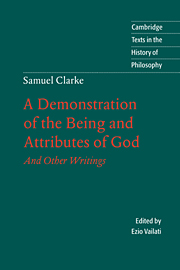Book contents
- Frontmatter
- Contents
- Acknowledgments
- List of abbreviations
- Introduction
- Chronology
- Further reading
- Note on the text
- A Demonstration of the Being and Attributes of God
- Other writings
- I Several Letters to the Reverend Dr. Clarke
- II The Answer to a Sixth Letter
- III The Answer to a Seventh Letter
- IV Letters to Dr. Clarke concerning Liberty and Necessity
- V From Remarks Upon a Book
- VI From Clarke's Sermons on Several Subjects
- VII From A Discourse concerning the Unchangeable Obligations of Natural Religion
- VIII From Four Defences of a Letter to Mr. Dodwell
- IX From A Collection of Papers which passed between the late learned Mr. Leibniz and Dr. Clarke
- Index
- Cambridge Texts in the History of Philosophy
IX - From A Collection of Papers which passed between the late learned Mr. Leibniz and Dr. Clarke
Published online by Cambridge University Press: 07 January 2010
- Frontmatter
- Contents
- Acknowledgments
- List of abbreviations
- Introduction
- Chronology
- Further reading
- Note on the text
- A Demonstration of the Being and Attributes of God
- Other writings
- I Several Letters to the Reverend Dr. Clarke
- II The Answer to a Sixth Letter
- III The Answer to a Seventh Letter
- IV Letters to Dr. Clarke concerning Liberty and Necessity
- V From Remarks Upon a Book
- VI From Clarke's Sermons on Several Subjects
- VII From A Discourse concerning the Unchangeable Obligations of Natural Religion
- VIII From Four Defences of a Letter to Mr. Dodwell
- IX From A Collection of Papers which passed between the late learned Mr. Leibniz and Dr. Clarke
- Index
- Cambridge Texts in the History of Philosophy
Summary
[Editor's Note: These two selections are from the appendix to Clarke's edition of his exchange with Leibniz. I give Clarke's translation of Leibniz's texts and add their standard titles and references. With these texts, Clarke clearly tried to show that Leibniz's own words proved that he held that matter is a substance; that, consequently, it always acts; that it is imbued with a spiritual principle, and consequently that it has some sort of proto-perception. In short, Clarke viewed Leibniz as a dangerous crypto-hylozoist.]
2[Wiv, 701–4].
“We must know that spontaneity, strictly speaking, is common to us with all simple substances, and that this, in an intelligent and free substance, amounts to a dominion over its own actions. … Naturally, every simple substance has perception” etc. (Theodicy, p. 291) [section 291].
“But active force contains a certain act or efficacy, and is something of a middle nature between the faculty of acting and action itself. It involves a conatus or endeavor, and is of itself carried towards action; and stands in need of no help but only that the impediment be taken away. This may be illustrated by the examples of a heavy body stretching the string it is hung by, and of a bow bent.
- Type
- Chapter
- Information
- Samuel Clarke: A Demonstration of the Being and Attributes of GodAnd Other Writings, pp. 161 - 164Publisher: Cambridge University PressPrint publication year: 1998

